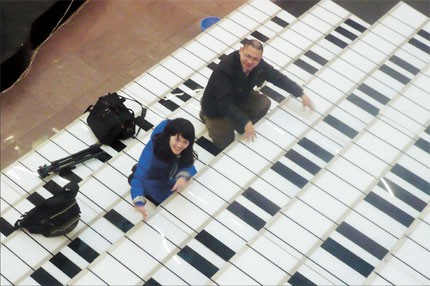Shanzhai CCTV Spring Festival gala to go online
 |
|
Lao Meng (right) helps set the stage. For the past one year, the 37-year-old Sichuan Province native has been working on his own grassroots shanzhai Spring Festival Gala Show. [Shanghai Daily] |
Two years ago when migrant Lao Meng was watching China Central Television's (CCTV) starry and glitzy Chinese Lunar New Year's Eve Gala Show during his lonely holiday in Beijing, he had a brainstorm.
Why not make his own cool, grassroots shanzhai (copycat) Spring Festival Gala Show with real people from around China, shanzhai that really rocks? A live, unpolished grassroots show online? A relaxed and pungent parody instead of an extravaganza?
After all, the 36-year-old was a creative director, event planner and producer of wedding videos. He moved to Beijing from Sichuan Province seven years ago.
It failed last year, but this year it's on - this time with official blessing - live, online and simultaneous with CCTV.
"Shanzhai," now a buzzword, refers to knock-offs of fancy brands, such as cell phones, and copycat versions of people, TV shows, events, art and other things.
Lao Meng's show, without MCs, will feature ordinary people from around the country in a casual atmosphere, singing and dancing, doing their thing, demonstrating folk arts and skills, putting on comedy routines, making music by banging on ceramic bowls and otherwise putting on a show. Some will tell touching stories.
Lao Meng, whose real name is Shi Meng, got an enthusiastic response last year and a huge amount of David-and-Goliath media exposure about an alternative show, a gutsy rival to CCTV that has broadcast the four-hour show - some would say ordeal - for 27 years since 1983.
Lao Meng got backers, advertising and lots of wanna-be performers for auditions.
In the end, it was never broadcast, probably because it generated too much media hype. Lao Meng did not receive permission to air it either on provincial satellite TV or online.
Supporters withdrew at the last minute. The shanzhai show was performed but the only show Chinese people saw were a few scenes broadcast after the event on no-account Websites.
This year Lao Meng has permission for a live online broadcast on www.openv.com from 8pm to midnight - the same hours as CCTV. It will be called CCSTV, China Central Shanzhai Television.
For people all over China, it's a tradition to gather together and watch the predictable CCTV medley to ring in the Lunar New Year. Last year an estimated 396 million people viewed it in China, 3 percent more than in 2008. Around 1 billion viewed it worldwide and online. The US Superbowl gets around 100 million viewers.
However, for Lao Meng and others, the four-plus hours of scripted singing and dancing by big names, acrobatic shows, mini comedies and chitchat get tedious.
"It doesn't mean the gala show is terrible or vulgar, but it's impossible for any TV producer to make a fresh program that appeals to all tastes, particularly in such a big country like China," Lao Meng tells Shanghai Daily.
"The CCTV gala has undoubtedly become a custom for many, just like dumplings and spring rolls to northern Chinese people during the holiday," he says. "What we're trying to do is offer our audience more choices for the celebration, even though it is just a dish of pungent pickles or tofu." A zesty parody.
Beijing's local administration of culture didn't approve, he says.
"This prompted me to improve communication with government officials to get their understanding and support," Lao Meng recalls.
In December 2009, Lao Meng and his team finally received official approval from relevant media and culture departments to host the first online grassroots gala on Chinese New Year's Eve.
He received applications for 400 acts by folk artists and ordinary Netizens. He has selected more than 20 original and fun shows, including folk songs, magic, comedy-drama, a fashion show, Peking Opera, calligraphy and extraordinary folk arts and skills. There's a percussion show that makes music on ceramic bowls.
 0
0 






